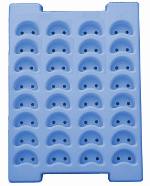comparing vacuum forming quotes - 8 point checklist
When you've obtained a number of quotes from different suppliers, it can be hard to compare them effectively through different quote layouts and small print. Here are the core things to look out for.
Price comparison – to ensure the other quotes are really like for like, check:
1. Which material will the vacuum forming tool be made from?
Vacuum forming tools can be made from wood, resin and aluminium. Depending on the level of detail required and on how many products you need, all may be good options. Wooden and resin tools are cheaper than aluminium, but only allow for much less detailed formings. Resin tools need an existing forming to cast the tool from initially. Both wood and resin have a much shorter life-span and are much easier to damage. Aluminium tools allow for special effects such as engraved or embossed text and last for several thousands of vacuum formings.
2. How many parts per sheet will the vacuum forming tool make?
A vacuum forming tool that makes several parts per sheet will be more expensive initially, but the forming costs per product will be much cheaper. Check if each former has quoted the same number of parts per sheet, or whether it's worth increasing. If the tool exists already, make sure you've given the vacuum formers the correct number of parts per sheet to base their quote on. The number of parts per sheet is also called how many “up”, for example a “2-up” tool.
3. What sheet thickness or material will be used to make the formings?
Sheets of material become considerably more expensive as they get thicker. Special materials, like antistatic or oil-resistant also come at a price. The sheet thickness also affects the sheet heating time and thus energy & machine costs. Make sure all formers have quoted using the same material.
Small print comparison! To avoid costly surprises, check :-
4. If your quote includes a vacuum forming tool, will you own the tool once it is made?
You should own the tool outright, otherwise the vacuum former may be able to vacuum form from your tool for a different customer. When we quote for adaptive vacuum formed trays, we may offer a special price if we can add the tool to our own range of standard trays. We'll never do this without your permission though!
5. Does the vacuum former tie you in to a minimum yearly order quantity, or charge for tool storage?
Some companies insist on a minimum quantity and will dispose of your tooling if you don't order that. They may also charge you for the storage of your tool. We store your tool securely with a  unique I.D. - it won't get lost.
unique I.D. - it won't get lost.
Beyond price comparisons
A good supplier should be a strategic business partner. Before you select your vacuum former based on price only, think about some other things.
6. Can they ensure production continuity?
Toolcraft have on-site toolmaking & maintenance facilities, as well as experienced designers. We can quickly get your tool back into action if any issues arise.
7. Do they offer finishing services?
We offer secondary operations such as roller cutting the formings out of the plastic sheet; creating holes - e.g. drainage or cable holes - by punching, drilling or roller cutting; and CNC machining for more advanced features such as shaped cutouts and guide rails. We also offer assembly & packaging - providing a great service & reducing manufacturing time.
8. Do they go above and beyond the call of duty?
We do. Get to know the Toolcraft team and don't just take if from us – our testimonials page will show you we're the right choice for your vacuum forming work.

